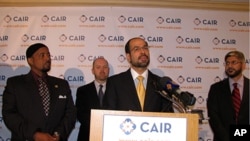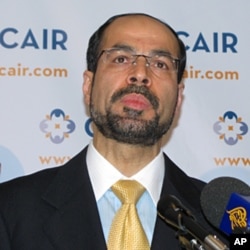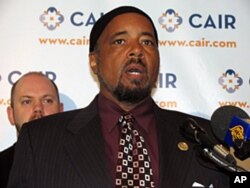President Barack Obama's June 4, 2009 address to the Islamic world in Cairo, Egypt, generated new hope for improved U.S. relations with Muslims in the Middle East and elsewhere. A year later, Muslims around the world are comparing Obama's healing words about bridging the divide with the progress made so far to achieve that goal. In Washington recently, leaders of several major American Muslim groups gathered to consider the impact of Obama's speech, and its as-yet-unfulfilled promises.
Nihad Awad, the Executive Director of the Council on American-Islamic Relations, or CAIR, says the American president has done a solid job in setting a new tone for improved relations with the Muslim world, and in meeting his promise of a timetable for leaving Iraq.
But there are still many important steps to be taken, Awad said. "De-escalate in Afghanistan, and engage in peaceful settlement and negotiations. On the Middle East front, we believe the president has to pressure Israel and keep the pressure until Israel changes its behavior and end the inhumane blockade on the Gazan people." And Awad added, "Engage the Muslim communities' leadership. He has not met yet with the Muslim leadership."
Some Muslims say their charitable giving has been unfairly targeted by U.S. anti-terrorism concerns
Other American Muslim leaders acknowledged that it is really too soon to judge the president, just one year after his Cairo address. But Imam Mahdi Bray, Executive Director of the Muslim American Society, said American Muslims should let the president know they are unhappy about a number of important issues, including the question of charitable giving. Many Muslim organizations believe the U.S. government has unfairly scrutinized their fund-raising operations for potential links to Islamist terrorist groups. Imam Bray said the government must do a better job of respecting Muslim-Americans' constitutionally guaranteed rights of free speech, free assembly and freedom of religion.
"Charity is a religious obligation upon Muslims and yet it is still being impeded," Bray asserted. "Lots of money that Muslims have given has never gone to the intended recipients, so that is a first amendment issue. The other thing is a 14th amendment issue; equal protection under the law. That is certainly spelled out as we deal with the issue of profiling at airports. Muslims are still subjected to a different scrutiny when it comes to the no-fly-list, when it comes to the watching list and when it comes to exiting and returning to America."
Similar civil rights concerns were expressed by Naeem Baig, the Executive Director of the Islamic Circle of North America.
"We feel that when it comes to civil liberties, when it comes to profiling at the airports, Muslims are facing it every day," Baig said. "And this is something where the community feels that we are still being seen as outsiders, not as partners, in bettering America."
Baig added that it would be a good idea for President Obama to visit a mosque or an Islamic center in the U.S. and meet with American Muslim leaders, something the President has yet to do since taking office in January, 2009. Baig said such a meeting would help overcome attempts by some in the U.S. to spread what he called hatred against Islam and American Muslims.
Alejandro Beutel, the government liaison at the Muslim Public Affairs Council, said he hopes the Obama Administration will also come to see the American Muslim community as an ally in its campaign against Islamist-inspired terrorism. "We as Muslims are committed to both safety and security of our nation, while upholding the constitution," Beutel said. "What people failed to realize is that almost one third of the terrorist plots here in the U.S. involving Al-Qaeda have actually been foiled with the assistance of Muslim Americans. "
The Muslim leader added that in the year since Obama's Cairo speech, American Muslims have been working to answer the president's call. They have been taking part in interfaith dialogues, reaching out to local non-Muslim communities, and calling on Muslims around the world to support American diplomatic and development efforts.






